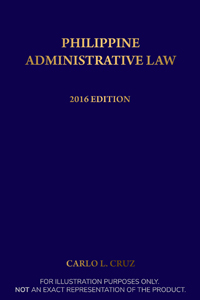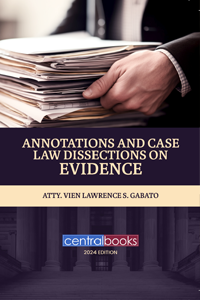- Philippine Administrative Law
- Carlo L. Cruz
- Publisher: Central Book Supply, Inc.
- ISBN: 978-621-02-0103-1
- No. of Pages: 697
- Size: 6 x 9
- Edition: 2016
Description:
This study shall focus on the factors which make up that field of public law known as Administrative Law. Specifically, it shall, as much and as comprehensively as possible, present the features as well as the state of Administrative Law in the Philippines.
The Constitution, Philippine jurisprudence and the many laws and rules and regulations relative to or depicting the establishment, functions and actual operations of Philippine administrative agencies serve as bases for this study. They will all show that Philippine Administrative Law has not achieved the stability of other fields in public law. This is so because it is a comparatively new development. It is believed, however, that, given the steady growth of administrative bodies, this field of study will eventually mature and become a permanent element of public law.








